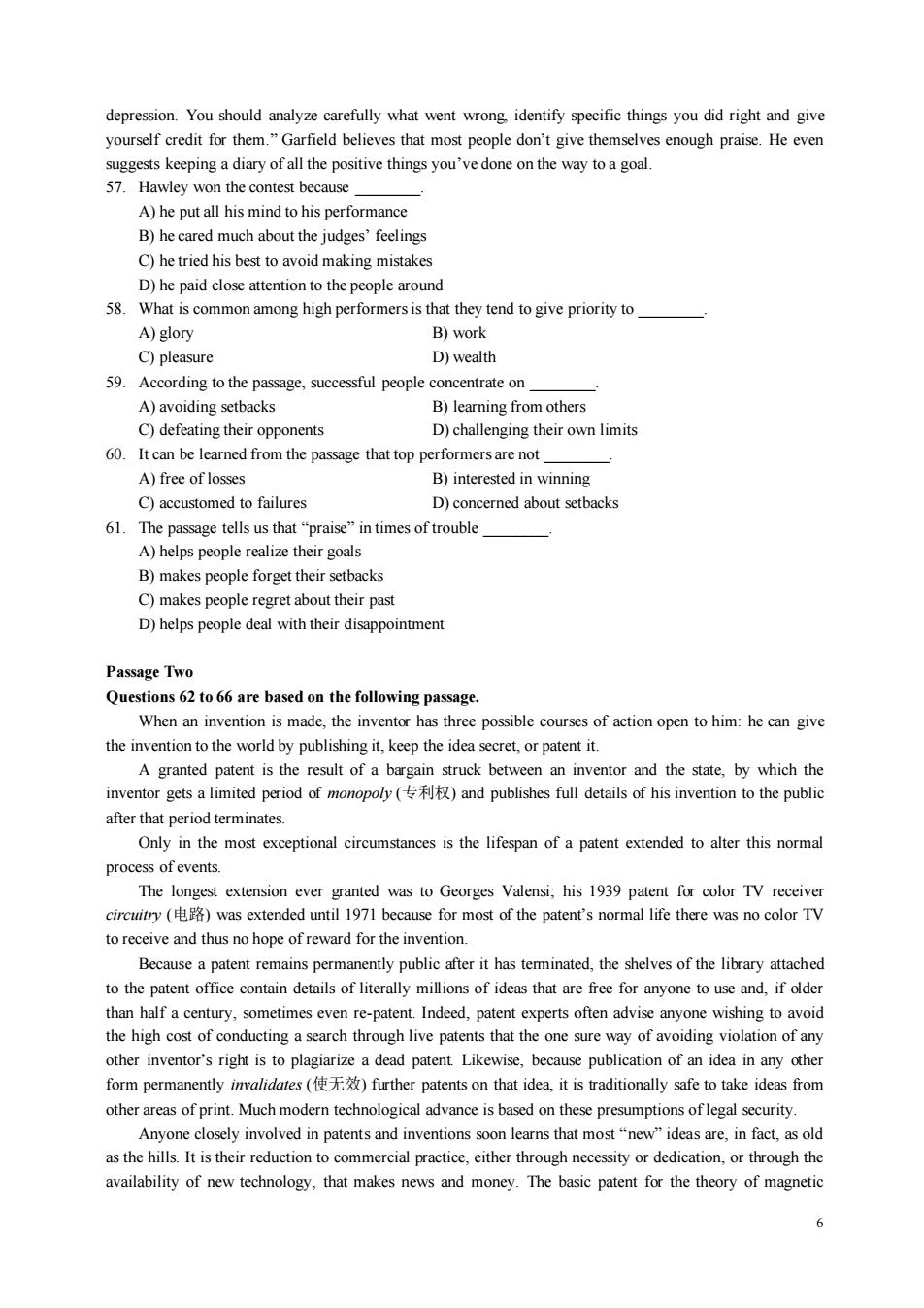正在加载图片...

depression.You should analyze carefully what went wrong identify specific things you did right and give yourself believes that don'tgive.He even suggests keeping a diary of all the positive things you've done on the way to a goal. 57.Hawley won the contest because a)he put all his mind to his performance B)he cared much about the judges'feelings C)he tried his best toavoid making mistake D)he paid close attention to the people aroun 58.What is common among high performers is that they tend to give priority to A)glorv B)work C)pleasure D)wealth 59. oncentrate on A)av B)learning from others C)defeating their opponents D)challenging their own limits 60.It can be learned from the passage that top performers are not A)free of losses B)interested in winning C)accustomed to failures D)concerned about setbacks 61. A)helps people realize their goals B)makes people forget their setbacks C)makes people regret about their past D)helps people deal with their disappointment Passage Two Questions 62 to66 are based on the following passage. When an invention is made,the inventor has three possible courses of action open to him:he can give the invention to the world by publishing it.keep the idea secret.or patent it. struck between an inventor and the state,by which the nV (传利 )and publishe s of his invention to the publi after that period terminates Only in the most exceptional circumstances is the lifespan of a patent extended to alter this normal process of events. The longest extension ever Cr(电路as ted was to George es Valensi;his 1939 patent for color TV receive 10711 use fo st of the patent's norma life there was no color TV to receive and thus no hope of reward for the invention. Because a patent remains permanently public after it has temminated,the shelves of the library attached to the patent office contain details of literally millions of ideas that are free for anyone to use and,if oder than half a re-patent Indeed,patent experts any one wishing to ayoid the high cost of conducting a search th ugh live natents that th ne sure of ding violationof other inventos right is to plag ead patent Likewis because publiction of n idea form permanently invalidates (further patents on that idea,it is traditionally safe to take ideas from other areas of print.Much modern technological advance is based on these presumptions oflegal security. Anyone closely involved in patents and inventions soon learns that most"new"ideas are.in fact.as old as the hills.It is their reduction to practice.either through necessity or dedication,or through the availability of new technology.that make news and money.The basic patent for the theory of magnetic6 depression. You should analyze carefully what went wrong, identify specific things you did right and give yourself credit for them.” Garfield believes that most people don’t give themselves enough praise. He even suggests keeping a diary of all the positive things you’ve done on the way to a goal. 57. Hawley won the contest because ________. A) he put all his mind to his performance B) he cared much about the judges’ feelings C) he tried his best to avoid making mistakes D) he paid close attention to the people around 58. What is common among high performers is that they tend to give priority to ________. A) glory B) work C) pleasure D) wealth 59. According to the passage, successful people concentrate on ________. A) avoiding setbacks B) learning from others C) defeating their opponents D) challenging their own limits 60. It can be learned from the passage that top performers are not ________. A) free of losses B) interested in winning C) accustomed to failures D) concerned about setbacks 61. The passage tells us that “praise” in times of trouble ________. A) helps people realize their goals B) makes people forget their setbacks C) makes people regret about their past D) helps people deal with their disappointment Passage Two Questions 62 to 66 are based on the following passage. When an invention is made, the inventor has three possible courses of action open to him: he can give the invention to the world by publishing it, keep the idea secret, or patent it. A granted patent is the result of a bargain struck between an inventor and the state, by which the inventor gets a limited period of monopoly (专利权) and publishes full details of his invention to the public after that period terminates. Only in the most exceptional circumstances is the lifespan of a patent extended to alter this normal process of events. The longest extension ever granted was to Georges Valensi; his 1939 patent for color TV receiver circuitry (电路) was extended until 1971 because for most of the patent’s normal life there was no color TV to receive and thus no hope of reward for the invention. Because a patent remains permanently public after it has terminated, the shelves of the library attached to the patent office contain details of literally millions of ideas that are free for anyone to use and, if older than half a century, sometimes even re-patent. Indeed, patent experts often advise anyone wishing to avoid the high cost of conducting a search through live patents that the one sure way of avoiding violation of any other inventor’s right is to plagiarize a dead patent. Likewise, because publication of an idea in any other form permanently invalidates (使无效) further patents on that idea, it is traditionally safe to take ideas from other areas of print. Much modern technological advance is based on these presumptions of legal security. Anyone closely involved in patents and inventions soon learns that most “new” ideas are, in fact, as old as the hills. It is their reduction to commercial practice, either through necessity or dedication, or through the availability of new technology, that makes news and money. The basic patent for the theory of magnetic